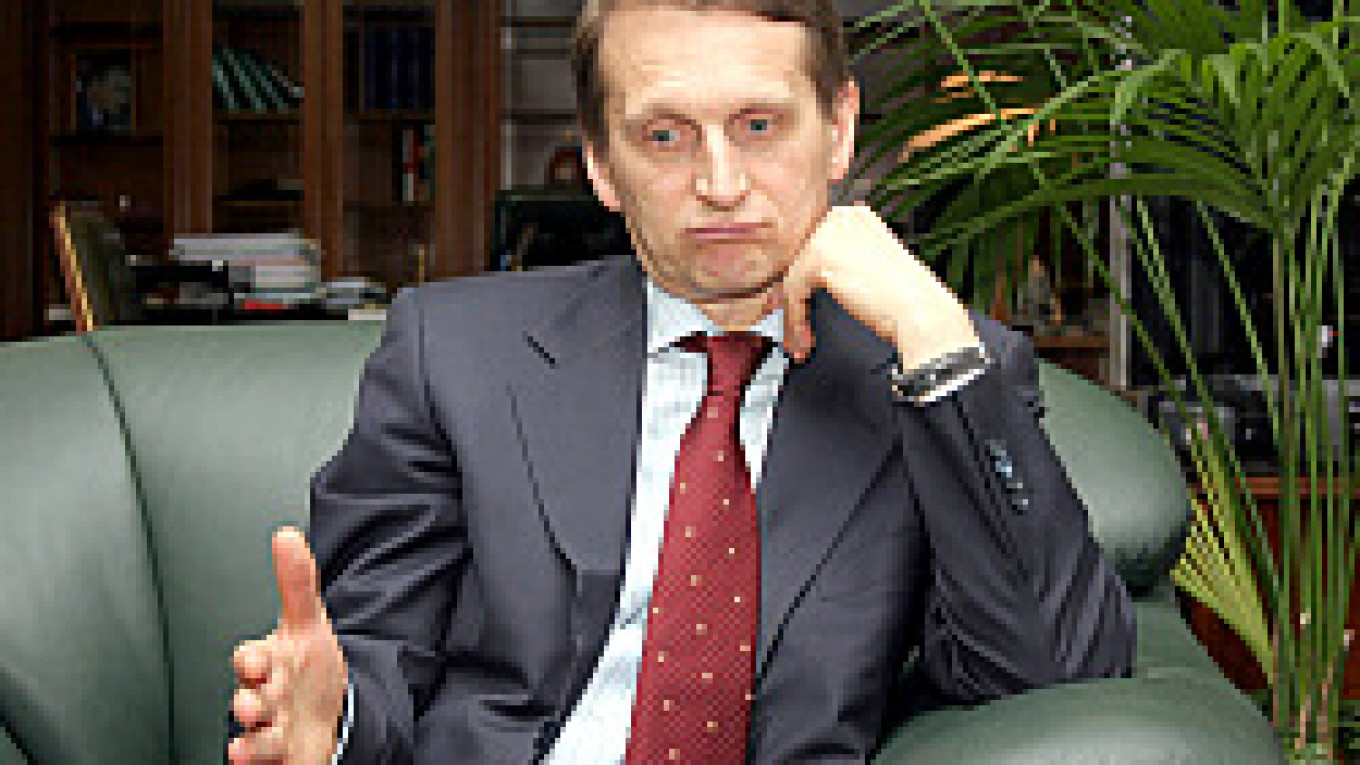President Vladimir Putin late Thursday appointed Naryshkin to the post, where he will oversee foreign trade, particularly with other former Soviet republics. Naryshkin likely will also keep his previous position of Cabinet chief of staff, Kommersant reported Friday, citing Cabinet sources.
Fradkov has publicly clashed with the liberal ministers in his Cabinet, notably with Economic Development and Trade Minister German Gref, and he appears to have influenced Naryshkin's appointment. Fradkov called for foreign trade to receive a greater emphasis in the Cabinet several times last year and even suggested that the Foreign Trade Ministry be re-established.
The appointment strengthens Fradkov and weakens his opponents, "liberals like Gref," said Roland Nash, chief strategist with Renaissance Capital.
It "elevates the position of foreign trade under the prime minister," Nash said, adding: "There's a big political angle to this foreign trade."
Since July 2004, Naryshkin has also been a member of Rosneft's board. Nash said this post could strengthen Rosneft's position within the administration with respect to foreign trade.
Naryshkin, 52, has worked in the federal government since 2004, a year that also saw him rapidly rise through the ranks. In February, he was appointed deputy head of the economic directorate within the presidential administration. The next month he was named Cabinet deputy chief of staff, and in September he was made chief of staff with the rank of Cabinet minister.
Naryshkin has played an "extremely powerful" role behind the scenes, said Denis Maslov, an analyst with Eurasia Group.
Naryshkin, a St. Petersburg native, is thought to be close to Putin. His acquaintance with Putin goes back to at least the early 1990s and perhaps, according to some media reports, to the 1980s. From 1992 to 1995, Naryshkin headed the foreign economic relations sub-department of economics and finance in the St. Petersburg Mayor's Office. Putin headed the department at the time. Kommersant reported Friday that Naryshkin had become acquainted with Putin even earlier, during a stint with the KGB after graduating from the Leningrad Mechanical Institute in 1982.
"He has known Putin forever and proven his loyalty," Maslov said, commenting on the two men's relationship.
After working with Putin in the early 1990s, Naryshkin headed Promstroibank's foreign investments department for two years before serving in the Leningrad regional administration for seven, first as head of its investments department and then as head of its foreign affairs committee.
He is now one of two deputy prime ministers in the Cabinet. The other, Alexander Zhukov, also has an economics portfolio. It was not immediately clear how they would split their authority.
Staff Writer Miriam Elder contributed to this report.
A Message from The Moscow Times:
Dear readers,
We are facing unprecedented challenges. Russia's Prosecutor General's Office has designated The Moscow Times as an "undesirable" organization, criminalizing our work and putting our staff at risk of prosecution. This follows our earlier unjust labeling as a "foreign agent."
These actions are direct attempts to silence independent journalism in Russia. The authorities claim our work "discredits the decisions of the Russian leadership." We see things differently: we strive to provide accurate, unbiased reporting on Russia.
We, the journalists of The Moscow Times, refuse to be silenced. But to continue our work, we need your help.
Your support, no matter how small, makes a world of difference. If you can, please support us monthly starting from just $2. It's quick to set up, and every contribution makes a significant impact.
By supporting The Moscow Times, you're defending open, independent journalism in the face of repression. Thank you for standing with us.
Remind me later.


